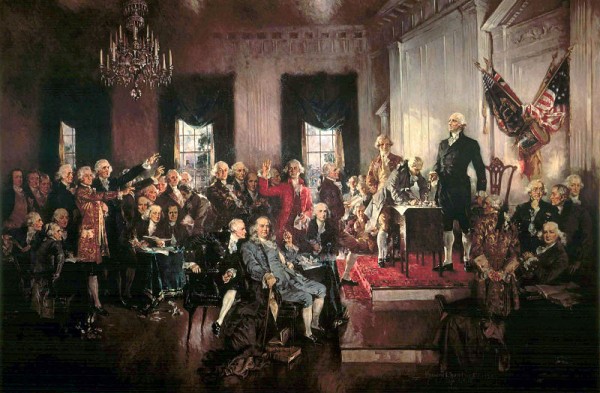
The background of this post is that the General Assembly passed the National Popular Vote Interstate Compact (NPVIC) for the second time since 2008 on Thursday, June 13, 2013 (then-Governor Donald Carcieri vetoed the legislation). I outlined my feelings about NPVIC last year when Senator Erin Lynch and Representative Raymond Gallison had bills out in the 2012 session. I don’t agree with Andrew Morse that electing the president by popular vote is a “crazy” idea; I think it’s maddening to elect our executive via the anti-democratic Electoral College.
I didn’t realize that the NPVIC was even introduced until I saw it was passed on Twitter, which shows how out of the loop I often am. One of the things that interested me were tweets by a Tea Party group, attributing Rep. Dennis Canario as claiming that NPVIC was unconstitutional, Rep. Lisa Baldelli-Hunt as arguing RI would get more irrelevant, and that some legislator explained how the Electoral College works.
Let’s get the irrelevancy argument out of the way. The area surrounding Providence consistently ranks in the top 50 – 100 media markets, meaning you can reach a lot of voters really quickly. If every vote counts now, not just the ones that win you electoral votes, you have a good reason to focus on going to media markets like Providence. I can anticipate the counter-counterarguments, but since they distract from the main points, I won’t get into them here.
What I really want to address is the thing I see reflected in the attributed remarks from Canario (for the record, no, the NPVIC is not unconstitutional, the Constitution gives the states the power to apportion their electoral votes as they wish). This seems to me to be what historian William Hogeland has referred to as “hyperconstitutionalism” which I’m interpreting to be the idea that the Constitution is this sacrosanct document that every piece of legislation needs to have a ton of textual support from. That’s not what the Constitution is; it’s a document of compromise created by compromised men and further amended by other compromised men (mostly). It’s one that can be further amended.
Hand-in-hand in this is the apotheosis of the Founders, elevating to them to a status of “can do no wrong” regardless of the fact that they did a lot of wrong. A lot. Samuel Adams helped engineer a coup d’etat that overthrew the Pennsylvania government led by John Dickinson that resisted declaring independence; despite Dickinson’s pro-reconciliation government having won an election the same month as the coup; remember, this was the state that was hosting the Second Continental Congress that eventually wrote the Declaration of Independence (Dickinson opposed independence, but prior to that point was the leading luminary in the colonies of resistance to British oppression). Alexander Hamilton, his mentor/war profiteer Robert Morris, and their allies encouraged a later coup d’etat to get the Continental Congress to agree to pay bondholders after the war (Washington stopped it, but the Continental Congress still adopted Morris’ and Hamilton’s plans).
Government isn’t a static institution, it’s one that needs to continually change. Some Founders recognized that; it’s how you get the transformation from the Articles of Confederation to the U.S. Constitution. But many opposed even that change; Rhode Island notably did (it’s not an accident no Rhode Islanders were delegated to go to the Constitutional Convention). Our founders were revolutionaries, some were radicals even by today’s standards (Thomas Paine, notably). If you look at their document as a revolutionary document, then it shouldn’t be hard for you to consider other revolutionary changes as well.
If you think of their document as essentially a codified version of the British constitution (which is unwritten), with a few changes, then it becomes easier to support the idea of a static republic. But that’s still bad. Think of all the things that were considered inconceivable or dangerously radical in the Founders’ day: black people voting or holding office, women voting or holding office, Indians voting or holding office, open homosexuality, people without property holding elective office, people without a certain threshold of personal wealth voting, a standing military, income tax, presidential campaigns, political parties, a nonpartisan press, etc., etc. There are hundreds of things we take for granted that many of the Founders would’ve been horrified to learn about. Because on hundreds of issues, it turns out that late 18th Century people are probably not best people to guide our decision-making in the 21st Century.
The argument for the Electoral College is an inherently antidemocratic argument. Its proponents do not trust the American people to select their own chief executive. That is the heart of this issue. You either believe in democracy or you believe in 538 people (mostly political party insiders) getting together to cast their votes for the person they want (there is nothing beyond laws in 24 states that prevent electors from being unfaithful to the voters of their state).
It’s small wonder that a majority of Americans consistently support a national popular vote for president; it’s patently clear: the system is undemocratic. The Founders wanted it that way; Edmund Randolph opened the Constitutional Convention noting that “our chief danger arises from the democratic part of our constitutions.” Randolph and many of his contemporaries feared democracy, they fear “the People” in whose name they were assembling. And they were wrong. We shouldn’t look to people who feared democracy to inform what we do in our democracy. We are Americans, and we, the People, get to make those decisions today.

